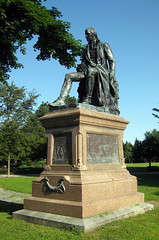Burns in real Scots
Burns wrote his poems in Scots, but he generally used English orthography.
For instance, here’s a bit of Auld Lang Syne together with its pronunciation in IPA (thanks to Wikipedia):
Should auld acquaintance be forgot,
and never brought to mind?
Should auld acquaintance be forgot,
and auld lang syne???d o??ld ?.kw?n.t?ns bi f??.?ot,
?n n?.v?? br?xt t? m?in?
??d o??ld ?.kw?n.t?ns bi f??.?ot,
?n o??l l?? s?in?And there’s a hand, my trusty fiere !
and gie’s a hand o’ thine !
And we’ll tak a right gude-willy waught,
for auld lang syne.?n ðe?rz ? ho??n, m? tr?s.t? fi??!
?? ?i?z ? ho??n ? ð?in!
?n wi?l tak ? r?xt ??d w?.l? wo??xt,
f?? o?l? la? s?in.

Sadly, these days even Scots find it hard to liberate themselves from English when they recite or sing the Bard’s poems.
For instance, if you go to BBC’s page about A man’s a man for a’ that, there are a good number of renditions of the poem. However, none of them are likely to resemble how Burns himself would have pronounced it. Even fairly basic words such as head is pronounced as /h?d/ rather than /hid/ by most of them.
Have we got to the point where most people in Scotland are unable to pronounce the words shared between English and Scots in Scots rather than English when they haven’t been spelt in a way to indicate the difference? If so, somebody needs to republish Rabbie Burns’s poems in Scots orthography before people get irrevocably used to the English pronunciation.
“Hand” was “hond” in Middle English. In our English Lit class how we tittered at “I wolde I hadde thy coillons in myn hond”, a line from Chaucer in which the speaker wishes to eunuchise his companion …
In the line from the Pardoner’s Tale that was written “And ringe it out as round as gooth a belle,” ‘out’ is pronounced ‘oot’ and ’round’ is pronounced ‘roond’. GH was also pronounced [x] in 15th Century English — so there was an overlap of pronunciation that at some point diverged.